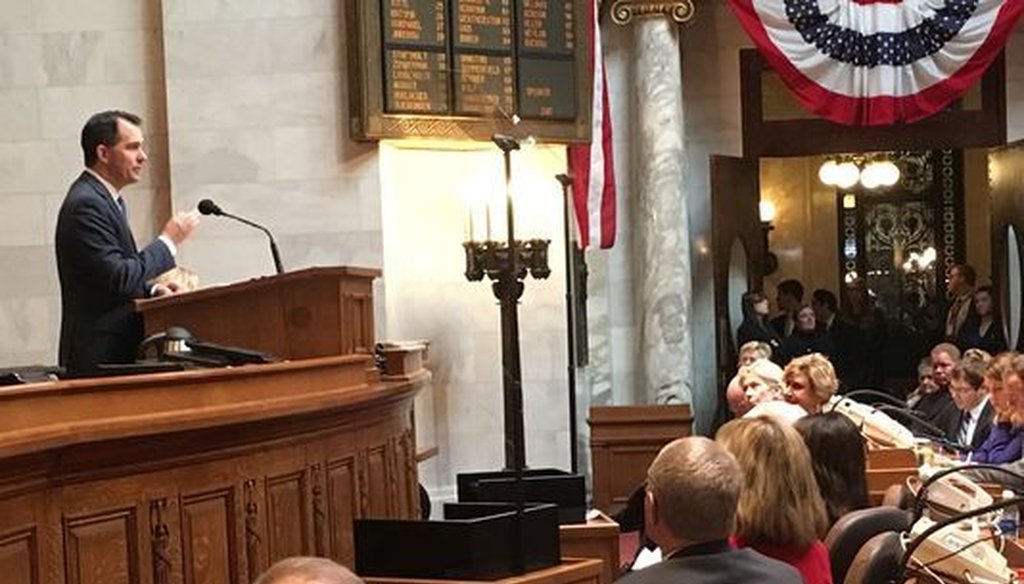



In his 2018 State of the State speech, Gov. Scott Walker contrasted himself with his predecessor, Democratic two-term Gov. Jim Doyle. (Michael Sears/Milwaukee Journal Sentinel)
In his Jan. 24, 2018, State of the State speech, something of a launching pad for his run for a third term as governor, Republican Scott Walker drew contrasts between himself and his predecessor, Democrat Jim Doyle.
Despite criticism for not spending more on transportation, Walker nevertheless claimed he’s done better than Doyle, stating:
"We invested" in our transportation system "$24 billion over eight years. That’s $3 billion more than what former Governor Jim Doyle spent on transportation over the same period of time."
Walker has made the same claim for at least 11 months, on Twitter, in a weekly radio address, in media interviews and in public appearances.
The numbers
The nonpartisan Legislative Fiscal Bureau told us it’s possible to reach Walker’s figures by considering the total raw dollars put toward transportation programs, including a double-count of the principal in terms of money borrowed.
That is, Walker’s method counts the principal at the time money was borrowed, and counts it again when repayments are made on that debt. That method shows Walker’s eight years of DOT funding, in raw dollars, including bonding and subsequent debt service payments, at $25.8 billion -- $3.4 billion more than Doyle.
But besides doing the double counting, that measure also fails to take into account inflation.
So, it is problematic in two ways.
Here are the fiscal bureau numbers without the double counting but including inflation:
Governor
Period
Real DOT funding
Difference
Jim Doyle
2003-’11
$18.7 billion
+$1.3 billion
Scott Walker
2011-’19
$17.4 billion
Those figures show that Doyle, in real dollars, spent more on transportation than Walker has.
We ran into a similar issue when Walker said in February 2017 the state is "investing more money into education than ever before in the history of Wisconsin." Our rating was Mostly False, since it didn’t take into account inflation, which is the best way to measure amounts over time.
Our rating
Walker says "we invested" in our transportation system "$24 billion over eight years. That’s $3 billion more than what former Governor Jim Doyle spent on transportation over the same period of time."
Walker’s claim uses raw dollars and counts the total amount of bonding, debt service and all funds put toward transportation. But that double-counts the principal and ignores inflation.
Excluding the double counting and taking into account inflation -- that is, real dollars spent on transportation -- Doyle actually spent more in his eight years than Walker has in his.
We rate Walker’s statement Mostly False.
More on Walker and transportation
Road project progress: In December 2017, Walker said: "Road projects across the state are staying on track or getting done sooner thanks to the good work of the team at the Wisconsin Department of Transportation." Our rating: Mostly False. He pointed to one highway project being ahead of schedule. But a wide range of other projects -- including major ones -- have been delayed.
Promises kept: In November 2017, we rated as a Promise Kept two pledges that Walker made during his 2014 campaign for a second term as governor. He repaid funds that had been raided from the state transportation fund, and he prevented any more raids from the funding from occurring.
Email, Gov. Scott Walker press secretary Amy Hasenberg, Jan. 25, 2018
Interview, Wisconsin Legislative Fiscal Bureau director Bob Lang, Jan. 30, 2018
Email, Wisconsin Legislative Fiscal Bureau fiscal analyst John Wilson-Tepeli, Jan. 30, 2018
Interview, Wisconsin Legislative Fiscal Bureau fiscal analyst Al Runde, Jan. 30, 2018
In a world of wild talk and fake news, help us stand up for the facts.
